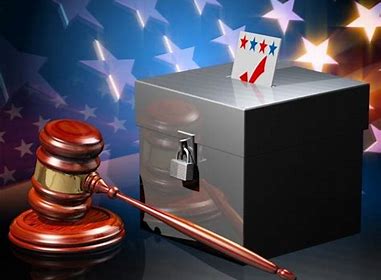Pennsylvania voters have spoken. Voters approved all four statewide ballot questions and we now know what the Republican and Democrat fields will look like in the appellate court races this fall. Also decided were four special elections, two in the House and two in the Senate. Here is a full accounting of the unofficial election results:
 We will be keeping a particular eye on the Pennsylvania Supreme Court race to fill the seat of retiring Justice Tom Saylor (R). Fresh on the minds of voters are issues like executive authority, Congressional redistricting and expanded liability. The campaign will determine if the court remains a 5-2 Democrat majority or turns into a 6-1 super Democrat majority. Voters will also choose one new Superior Court judge and two new judges for the Commonwealth Court this fall.
We will be keeping a particular eye on the Pennsylvania Supreme Court race to fill the seat of retiring Justice Tom Saylor (R). Fresh on the minds of voters are issues like executive authority, Congressional redistricting and expanded liability. The campaign will determine if the court remains a 5-2 Democrat majority or turns into a 6-1 super Democrat majority. Voters will also choose one new Superior Court judge and two new judges for the Commonwealth Court this fall.With the Primary behind us, attention in Harrisburg will turn to the budget and Governor Tom Wolf’s $37.8 billion spending proposal which includes increasing the state’s personal income tax from 3.07 percent to 4.49 percent, a significant increase in education funding and a severance tax on Marcellus Shale extraction. The Republican majorities in the House and Senate are promising push back. Pennsylvania’s constitution requires passage of a budget by the end of June.
In the meantime, we continue to remind legislators that passing liability relief related to Covid-19 remains an essential component of the state’s pandemic response. HB 605, providing targeted and temporary relief from Covid related liability, is currently in the Senate Judiciary Committee waiting consideration. – Curt Schroder
2021 Primary Election Results
Statewide Judicial Races (unofficial winning candidates in RED)
Note: You can review PCCJR’s questionnaire responses by several of the winning judicial candidates here.
Justice of the Supreme Court: 2021- One Vacancy
- Democrat Maria McLaughlin was running unopposed in the primary and will advance to the General Election.
- Paula Patrick, Kevin Brobson and Patricia McCullough were running for the Republican nomination. Brobson will advance to the General Election.
Judge of the Superior Court of Pennsylvania: 2021- One Vacancy
- Jill Beck, Timika Lane and Bryan Neft were running for the Democrat nomination. Lane will advance to the General Election.
- Republican Megan Sullivan was running unopposed in the primary and will advance to the General Election.
Judge of the Commonwealth Court: 2021- Two Vacancies
- Lori Dumas, Sierra Street, David Spurgeon, Amanda Green Hawkins were running for the Democrat nomination. Dumas and Spurgeon will advance to the General Election.
- Republicans Drew Crompton and Stacy Marie Wallace were running unopposed in the primary and will advance to the General Election.
Special Elections- State House & State Senate
Four special elections were held during the primary to fill vacant seats in the General Assembly. Once election results are certified, the winners will be sworn-in and immediately take over the vacant seat.
- A special election was held for the 59th House District left vacant after the death of state Rep. Mike Reese, R-Mt. Pleasant. The district includes parts of Westmoreland and Somerset counties. Democrat Mariah Fisher, Republican Leslie Baum Rossi and Libertarian Robb Luther were on the ballot. The unofficial winner is Leslie Baum Rossi.
- A special election was held in the 60th House District left vacant after the retirement of Rep. Jeff Pyle, R-Ford City. The district includes parts of Armstrong, Butler and Indiana counties. Republican Abby Major, Democratic Frank Prazenica, and Libertarian Andrew Hreha were on the ballot. The unofficial winner is Abby Major.
- A special election was held in the 48th Senate District left vacant after the death of Sen. Dave Arnold, R. The district includes Lebanon and parts of Dauphin and York counties. Republican candidate Christopher Gebhard, Democrat Calvin Clements, Independent Ed Krebs and Libertarian Tim McMaster were on the ballot. The unofficial winner is Christopher Gebhard.
- A special election was held in the 22nd Senate District left vacant after the retirement of Sen. John Blake, D. The district includes parts of Lackawanna, Luzerne and Monroe counties. Republican Chris Chermak, Democrat Marty Flynn (current state representative), Libertarian Nathan Covington and Green Party Marlene Sebastianellli were on the ballot. The unofficial winner is Marty Flynn.
Statewide Ballot Questions
Four statewide ballot questions were on the primary election slate for Pennsylvania voters to decide; including three that would make changes to the state’s constitution. The questions included two specific referendums that address how future state of emergencies will be handled in Pennsylvania.
- Question one asked voters to give the state’s General Assembly authority to extend or terminate a governor’s initial emergency declaration order. 52.16% voted YES
- Question two asked voters to amend the state constitution to limit all state of emergencies issued by a governor to 21 days. 52.09% voted YES
- Question three asked voters to amend the state constitution to specifically prohibit restricting or denying a person’s equal rights on the grounds of race or ethnicity. 72.35% voted YES
- The last question asked voters to authorize permission for paid municipal fire and medical rescue companies to apply for loans from a state program that currently provides funding only for volunteer fire and EMS agencies. 72.91% voted YES


